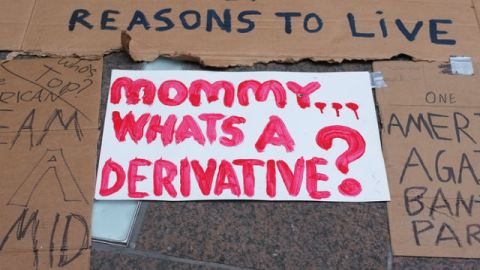Wall Street Protests: Time to Press the Economic Reset Button?

Peaceful protests against an economic elite. A violent reaction from authorities. Political polarization and growing unrest. Some months ago, these words could have described Tunisia on the verge of the Arab Spring. Today, they describe the United States.
Just like the Tunisians, the Americans protesting on Wall Street have a legitimate grievance. A small elite took the economy in a dangerous direction, robbing the majority of economic opportunities. The United States lived beyond its means through a decade of cheap credit, and now it is paying the price. The problem is that the people who lived high on the hog before are not necessarily the same ones making sacrifices today.
To be sure, millions of Americans did benefit from the ocean of easy money that the Federal Reserve pumped into the economy beginning with the recession of 2001. A family carrying a 30-year $200,000 mortgage would pay about $5,000 less per year at an interest rate of 5% than at 8%. Plenty of families refinanced, took out home equity loans, or received mortgages that ordinarily would have been out of reach. Plenty of others got low car and credit card payments.
But the captains of finance took things too far, and millions more Americans – many of whom had little stake in the markets – have paid the price. The bankers weren’t the only ones responsible, of course. The government also abdicated its responsibility. Alan Greenspan, the former chairman of the Federal Reserve board, kept the taps open too long; he put his personal legacy above the nation’s financial health. He and others also argued for a hands-off approach to the markets, and in 2000 the Commodities Futures Modernization Act actually removed whole classes of derivatives from monitoring and regulation.
The Economic Crisis: a Symptom, Not the Cause
These failings led to the current crisis, but they alone do not account for the deep feelings of frustration and injustice that has brought shouting people into the street. Just as in Tunisia, economic opportunity for the masses has dwindled. Social mobility has been dropping for decades as the economy has become less meritocratic. Money and connections are determining access to education, jobs, and political power; with inequality growing, Americans are entering the economic race from increasingly different starting lines.
This is serious problem that should worry the wealthy as much as the working class. A less meritocratic economy grows less quickly, because it’s more likely that opportunities will go to the rich and ungifted than to the poor and talented. Moreover, hard work is not always rewarded, dulling incentives for the rank and file of the labor force.
All is not lost, however. The United States is still one of the world’s best places for innovation and entrepreneurship. Here there is another parallel with Tunisia, which had created a better business climate than several members of the European Union. Tunisians didn’t want to destroy what their country had built. What they wanted was a new settlement – a new distribution of opportunities within their growing economy. So, after a brief and largely bloodless revolt, they got it.
A Revolution Divided
The United States needs a new settlement, too. The problem now is that Americans cannot agree on what it should be. Some see owners of capital as the problem – Wall Street bankers and the politicians who have been working to eliminate taxes on capital. Since the beginning of the Bush administration (as I wrote in Neoconomy), it has become much easier for people who get their income from capital rather than labor to avoid taxes altogether; this is why Warren Buffett pays a smaller share of his income to the government than many of his employees. But others see government itself as the problem. They think that reducing spending, regulation, and taxes will allow the economy to flourish again.
It’s true that some taxes and regulations may do more harm than good. The corporate income tax, for example, is a volatile source of revenue whose effects on the economy are poorly understood, even by economists. It also gives companies an incentive to relocate overseas, which is becoming easier as information and communication technology improves. Other taxes might be better tools for raising revenue in the long term.
Yet taxes, regulation, and government spending are also among the most effective tools for making the economy more meritocratic. They ensure that the wealthy help to pay for the public goods – safety, security, and stability – that allowed them to succeed. They give young people not born to privilege a chance at education and advancement. And they can put the brakes on behavior that puts short-term gain above the economy’s long-term interests.
Choosing the right economic policies for the future is never easy, and the growing political split in the United States is an additional and unwelcome challenge. With any luck, the 2012 electoral campaign will feature some earnest debate about the nation’s economic future rather than the usual sloganeering. Of course, politicians respond to what they think voters want, so the responsibility for launching this debate is ours as well.





